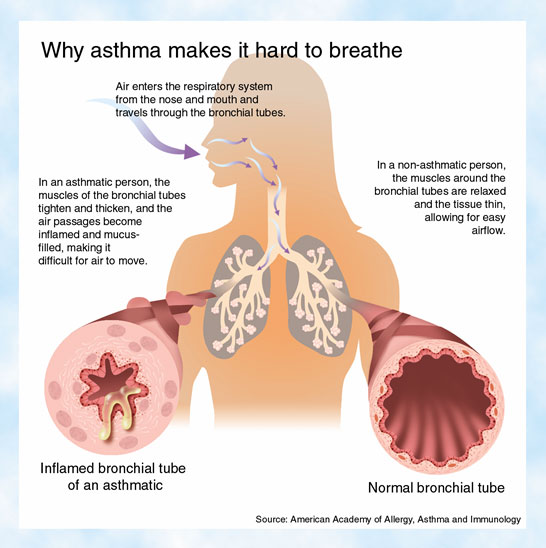Health Matters: Asthma


According to the World Health Organization (WHO), asthma is a chronic disease characterized by recurrent attacks of breathlessness and wheezing, which vary in severity and frequency from person to person. It is a common chronic airway disorder characterized by periods of reversible airflow obstruction known as asthma attacks.
WHO estimates that 235 million people worldwide suffer from asthma. It is said to be the most common chronic disease among children and its not just a public health problem for high income countries: it occurs in all countries regardless of level of development. Over 80% of asthma deaths occur in low and lower-middle income countries.
Despite its prevalence, it is under-diagnosed and under-treated, creating a substantial burden to individuals, families and possibly restricting individuals’ activities for a lifetime.
Asthma attack and triggers
During an asthma attack, the lining of the bronchial tubes swells, causing the airways to narrow and reducing the flow of air into and out of the lungs. Airflow is obstructed by inflammation and airway hyper reactivity (contraction of the small muscles surrounding the airways) in reaction to certain exposures. Some of these exposures include exercise, infection, allergens (e.g. pollen), occupational exposures (e.g., chemicals), and airborne irritants (e.g., environmental, tobacco smoke). Other triggers can include cold air, extreme emotional arousal such as anger or fear, and physical exercise.
In some people, asthma can even be triggered by certain medications, such as aspirin and other non-steroid anti-inflammatory drugs (NSAIDs), and beta-blockers (which are used to treat high blood pressure, migraines and heart conditions).
Symptoms
Symptoms may include wheezing, coughing, shortness of breath, and chest tightness. Recurrent asthma symptoms frequently cause sleeplessness, daytime fatigue, reduced activity levels and school and work absenteeism. Asthma has a relatively low fatality rate compared to other chronic diseases. It is not clear how to prevent asthma from developing and there is no cure.
Treatment
Studies indicate that current therapeutic approaches are effective in controlling symptoms, reducing airflow limitation, and preventing exacerbations, but currently available treatments do not appear to prevent the progression of asthma in children.
As various phenotypes of asthma are defined, and inflammatory and genetic factors become more apparent, new therapeutic approaches may be developed that will allow even greater specificity to tailor treatment to the individual patient’s needs and circumstances.
Risk Factors
Asthma affects people of all ages, but it most often starts during childhood. Young children who often wheeze and have respiratory infections—as well as certain other risk factors—are at highest risk of developing asthma that continues beyond 6 years of age. The other risk factors include having allergies, eczema (an allergic skin condition), or parents who have asthma. Among children, more boys have asthma than girls.
But among adults, more women have the disease than men. It’s not clear whether or how sex and sex hormones play a role in causing asthma. Most, but not all people who have asthma have allergies. Some people develop asthma because of contact with certain chemical irritants or industrial dusts in the workplace. This type of asthma is called occupational asthma.
Management of asthma
Although, asthma cannot be cured, appropriate management can control the disease and enable people to enjoy good quality of life. Short-term medications are used to relieve symptoms. People with persistent symptoms must take long-term medication daily to control the underlying inflammation and prevent symptoms and exacerbations.
Medication is not the only way to control asthma. It is also important to avoid asthma triggers – stimuli that irritate and inflame the airways. With medical support, each asthma patient must learn what triggers he or she should avoid.
Although, asthma does not kill on the scale of chronic obstructive pulmonary disease (COPD) or other chronic diseases, failure to use appropriate medications or to adhere to treatment can lead to death.










